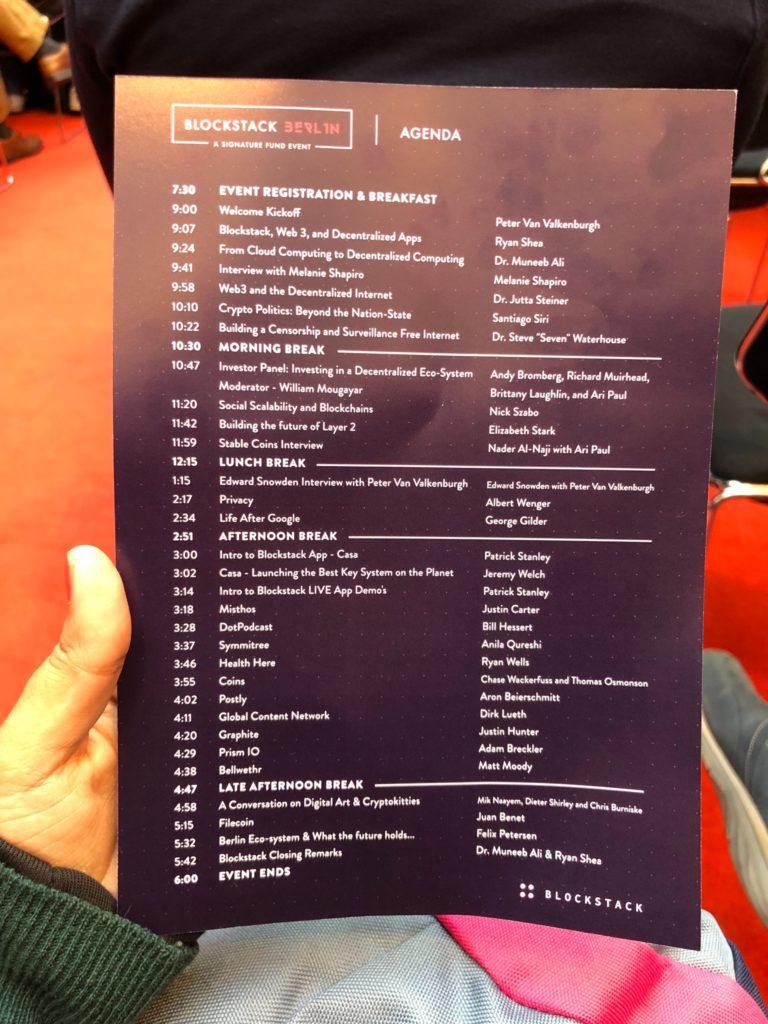I attended Blockstack Berlin event yesterday and here are my notes. In case you’re not very familiar with the cryptocurrencies or blockchain space, I recommend going through my reading list on bitcoin and ethereum first.
The Agenda
What attracted me to travel from Pune, India to Berlin, Germany was the impressive list of speakers. I was specifically interested in listening to Edward Snowden (the famous whistleblower), Nick Sbazo (creator of bitgold, precursor to bitcoin), and Albert Wenger (author of world after capital).
Here’s the full agenda:

My notes
These notes are not comprehensive; they are the ideas and perspectives that caught my attention. I’m pretty sure like last year, Blockstack this year too will release videos from all talks on their youtube channel. So keep an eye on it.
1/ Founder of CoinCenter – a non-profit educating governments on bitcoin, @valkenburgh said the reason blockchain and crypto are important is because Internet is an adversarial environment. You can believe that people are generally good, but you have to design open, decentralized systems with the assumption that malicious entities exist and will try their best to take personal advantage.
2/ @valkenburgh recommended reading: A Declaration of the Independence of Cyberspace. I didn’t know John Perry Barlow – founder of Electronic Freedom Foundation was also a lead singer for The Grateful Dead.
3/ Technology is not inherently good or bad – it is an expression of human will and values. The same technology (say Internet) can be used for good (freedom) or for slavery (mass propaganda). Technology is neutral, said @valkenburgh.
4/ Cofounder of Blockstack, @ryanshea said that the mission of Blockstack is to enable these four properties of decentralized apps (Dapps): a) runs on device of your choice; b) lets you bring your ID; c) lets you bring your data; d) lets you bring your assets.
5/ @Muneeb, cofounder of Blockstack, talked about the recurring trend in computing: centralization/decentralization (mainframes -> PC -> cloud computing -> decentralized computing). Note to myself: why does this bundling or unbundling happens in waves? This trend is also central thesis of The Master Switch by @superwuster
6/ @Muneeb suggested that a developer selecting a platform for developing decentralized apps should ask these questions: a) can it scale to millions of users? b) is it secure? (what’s the attack surface); c) does it have developer tools? I’ll add another one to the list: d) does it solve a real user problem?
This is cool https://t.co/6TEb0DcdcY
A ring which stores your private keys and which pairs using fingerprint (that prevents against theft)
— Paras Chopra (@paraschopra) March 2, 2018
7/ @jutta_steiner defined web 3.0 (that’s what everyone is calling decentralized web now) as reliable means of making applications available under adverse conditions – both intentional and unintentional.
Interesting analogy -> Traditional web vs decentralisated web by @jutta_steiner pic.twitter.com/5KLD0HSP00
— Paras Chopra (@paraschopra) March 2, 2018
8/ @santisiri, founder of democracy.earth gave a very interesting talk on nation-states and crypto. He defined nation-states as monopolies of money and force that are limited by geography.
9/ @santisiri said that democracy is in decay due to conflict between cloud (corporations) and land (nation-states).
Venezuela government detected increase in electricity usage to detect and apprehend bitcoin miners pic.twitter.com/vkg29bkus0
— Paras Chopra (@paraschopra) March 2, 2018
10/ @deseventral, cofounder of orchidprotocol – marketplace for VPNs, says that a surveillance state is successful if its citizens behave as if surveillance is everywhere (even if it’s not). He says people in regions of China are stopped where police check their phones if they are using any unauthorized apps. Scary!
11/ @valkenburgh introduced the audience to the Goodharth’s law which says: ‘When a measure becomes a target, it ceases to be a good measure‘. For example, GDP includes military spending so measuring GDP growth alone isn’t good. Similarly focus on marketcap for crypto is bad.
12/ Then there was investor panel with @AriDavidPaul , @andy_bromberg, @richardmuirhead and @br_ttany. Major insights: what’s changed is that with tokenizing open source, value capture in open source has become directly possible now. That’s the interest of VCs in crypto space.
13/ A lot of variables in cryptospace are unknown: “there’s no single utility app in crypto right now”. There’s no clarity on the total addressable market. Also, there’s tragedy of commons in decentralization: “the more decentralized an app is, less incentivized is each individual to improve it”.
14/ Network effects in protocols mean that value may not accrue to initial founding team / project. As projects fork, the value can accrue to even 20-30 projects. This is what VCs have to be cognizant of.
15/ “When you’re investing in open source network effects, you are asking whether network effects can sustain until switching costs become high that users don’t switch to a forked version“.
16/ @nickszabo4 defined markets as a network of contracts. As markets expand –> greater division of labour -> greater productivity. This is why markets drive economic growth.
17/ Markets have caused all economic and material growth of the modern century. @NickSbazo4 made me think that although communism sounds great in theory and resonates with intuition, it had horrific consequences. Our intuition about what’s right and wrong may not turn out to be right on deeper thinking. This idea is the basis of moral reasoning.
18/ @NickSbazo4 key message: trust scales poorly and trusted 3rd parties are security and lawyer magnets. The design objectives of networks online should be to minimize need to trust any single party.
19/ @NickSbazo4 also said that governments and institutions have argument surface which allow many different entities to slow down decisions. This is the fundamental tradeoff of speed v/s reversibility of decisions that Jeff Bezos also talks about as Type 1 and Type 2 decisions.
20/ @starkness, founder of the lightning network (that enables scalability and speed on bitcoin) said that bitcoin is like savings account while lightning is like checking account on top of it. Bitcoin blockchain is increasingly becoming the settlement layer while other protocols like lightning enable more interesting stuff to happen on the protocol.
At #blockstackberlin it’s hard to differentiate what’s company, what’s a project and what’s a movement is hard to make. They all seem to be blurring for good.
Excitement-level-for-this: 90%
Confidence: 75%— Paras Chopra (@paraschopra) March 2, 2018
21/ @nadertheory, founder of basecoin – a cryptocurrency whose price doesn’t fluctuate (these cryptocoins are called stablecoins) – said that volatility is bad for long term contracts. Uncertainty of price causes many types of contracts to simply not happen.
22/ @nadertheory also said that even though gold has been in existence for centuries, it’s price can still have a volatility of upto 15% per year. He suggested that basecoin has the right incentives built into the system so that participants can profit from reducing volatility.
23/ I loved @nadertheory‘s perspective that basecoin isn’t a threat to US dollar rather stablecoins compete with weak and rapidly depreciating currencies which citizens have lost trust on (like in Venezuela). Although reaching such places and getting adoption is going to be difficult.
24/ Note to myself: market inefficiencies should be solved via market mechanisms (and not central institutions)
25/ Now for the main reason I went from India to Germany: listening to @Snowden. Here are some gems: a) people who make laws never imagine how others may end up interpreting and applying it; b) we must know what we as humans want (only then can we make tech work towards it)
26/ @Snowden: even good politicians do horrible things in the political system because it’s the system that has a life of its own. E.g. under Obama’s presidency, drone strikes increased.
27/ @Snowden: the benefit of smart contracts is that you can define laws precisely. In reality, people exploit loopholes and underspecification in laws for their goals. If such laws are encoded in code, doing that would be impossible.
28/ @Snowden: Blockchains unlocks and enables new human abilities (such as trusting anyone, even geographically distant). However, every human capability (not just tech) will be abused.
29/ @Snowden: tools and capabilities multiply human potential (both good and bad). The case for unfettered progress in new tech depends on whether we believe humans are generally good or generally bad. Do you? (I do).
30/ @valkenburgh asked @Snowden whether people who architect really complicated cryptographic systems get a sort of godlike power (where they can even leave backdoors in their open source projects because nobody else understands the tech as well as they do).
31/ @Snowden said: we’re already in a world where you can’t compete with technocractic elites but that’s okay because we’d rather have a battle for brains than a battle for dollars.
32/ @albertwenger talked about how privacy is increasingly at odds with technology progress. He said as technology progresses there are more ways to destroy than to create, so if anyone can 3D print an AK-47 in their basement, do we want privacy for them or we want to detect and stop those acts?
33/ @albertwenger‘s alternatives to privacy: a) economic freedom (universal basic income to everyone); b) informational freedom (all data is default public, but signed by respective individuals). He urged to campaign to the government to make all its data public.

34/ Lastly, @dete73 and @mik_naayem creators of Cryptokitties said they ‘cryptokitties were created to satisfied cryptocuriosity‘. Many people became faimilar and got their first cryptocurrency because of cryptokitties so they’ve been pretty successful with their project! (BTW – all art is hand drawn).
Join 200k followers
Follow @paraschopra